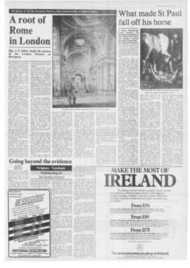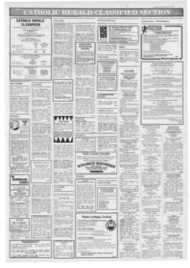Page 3, 27th April 1984
Page 3

Report an error
Noticed an error on this page?If you've noticed an error in this article please click here to report it.
Tags
Share
Related articles
Liberation Theology In Focus Again
Curia Head Calls Liberation Theology 'error'
New Birth Control Code On The Way
New Vatican Document On Liberation Theology 'out By...
Boff Trial In Rome Ends In 'truce'
Ratzinger puts on show of force
From Desmond O'Grady hi
Rome
THEOLOGY appears to be not the only issue involved in the current argument about liberation theology. Cardinal Joseph Ratzinger, who has twice criticised aspects of the theology was accompanied at his Vatican press conference this week by the French dominican Jerome Hamer who has just been named Head of the Congregation for Religious.
Hamer is expected to be tougher than his predecessor, the Argentinian "progressive" Cardinal Eduardo Pironio. And as Hamer has also warned against the dangers of a people's church", he is fikety to crack down on any proponent of liberation theology among the religious orders theologians.
This leads on to another danger in what is already a tricky problem for the Pope. One cause of tension in recent years between the Church's most prestigious religious order, the Jesuits, and the Vatican was the Jesuits approach to sociopolitical questions.
Towards the end of his period as Jesuit Superior. Father Pedro Arrupe issued a document which tackled the use of marxist social analysis which raised Vatican hackles.
Will the issue surface again after the response of Joseph Vives, the Spanish Jesuit to Ratzinger. Vives was a delegate at the last Jesuit General Congregation. If so, it will test the new Jesuit leader, the Dutchman Father Peter Hans Kolvenbach who. since his election last year, has kept such a low profile.
The Vatican is moving late on liberation theology. As theology it seems to have peaked in the 1970's. But it has forced theologians to become interested in analyses of structures of oppression and political realities.
The current discussion has been provoked by a position paper by Cardinal Ratzinger in the Italian monthly "30 Giorni" (Thirty Days). The cardinal, along with other theologians was asked by the Pope for his opinion on the theology of liberation. Ratzinger was not writing as head of the Doctrinal Congregation and the debate is taking place before an official Vatican stand is taken. But the issue will be a test for the Pope.
Some say his experience of Marxism in Poland makes him misjudge the Latin American situation. But liberation theology is influential beyond Latin America.
Ratzinger mentioned India, Sri Lanka, the Philippines Taiwan and Africa — indeed whenever belief in Christ is the motive for opposition to oppression.
Critics of liberation theology imply it favours violence and evoke images of the Colorrthian priest Camille Torres who, died in the 1960s bearing arms with the guerillas. Its advocates think rather of the prophetic witness of priests such as the Salvadoran Jesuit, Father Rutilio Grande whose defence of poor peasants brought his murder by rightwingers in 1977.
At best, liberation theology gives the poor new dignity and energy. At its worst, it can be sectarian identifying the Church with one class and denying the need for an ecclesiastical hierarchy.
Ratzinger's paper for the Pope criticised the identification of the poor of the Bible with the proletariat. The biblical idea of the poor is of the person who recognises his need of God — the poor in spirit.
blog comments powered by Disqus












